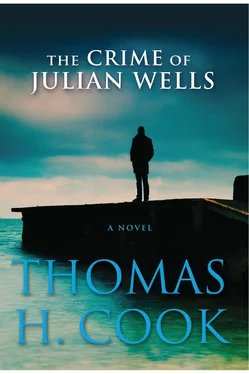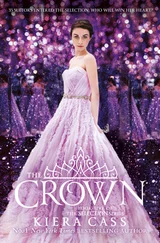Thomas Cook - The Crime of Julian Wells
Здесь есть возможность читать онлайн «Thomas Cook - The Crime of Julian Wells» весь текст электронной книги совершенно бесплатно (целиком полную версию без сокращений). В некоторых случаях можно слушать аудио, скачать через торрент в формате fb2 и присутствует краткое содержание. Год выпуска: 2012, ISBN: 2012, Издательство: Grove Press, Жанр: Криминальный детектив, на английском языке. Описание произведения, (предисловие) а так же отзывы посетителей доступны на портале библиотеки ЛибКат.
- Название:The Crime of Julian Wells
- Автор:
- Издательство:Grove Press
- Жанр:
- Год:2012
- ISBN:9780802194589
- Рейтинг книги:5 / 5. Голосов: 1
-
Избранное:Добавить в избранное
- Отзывы:
-
Ваша оценка:
- 100
- 1
- 2
- 3
- 4
- 5
The Crime of Julian Wells: краткое содержание, описание и аннотация
Предлагаем к чтению аннотацию, описание, краткое содержание или предисловие (зависит от того, что написал сам автор книги «The Crime of Julian Wells»). Если вы не нашли необходимую информацию о книге — напишите в комментариях, мы постараемся отыскать её.
The Crime of Julian Wells — читать онлайн бесплатно полную книгу (весь текст) целиком
Ниже представлен текст книги, разбитый по страницам. Система сохранения места последней прочитанной страницы, позволяет с удобством читать онлайн бесплатно книгу «The Crime of Julian Wells», без необходимости каждый раз заново искать на чём Вы остановились. Поставьте закладку, и сможете в любой момент перейти на страницу, на которой закончили чтение.
Интервал:
Закладка:
“I’ll come, too,” Julian volunteered immediately.
“No,” Marisol said softly. “It is for me to do this.”
And I thought, here is the soul of goodness: love, duty, sacrifice, and atonement, all combined to form something for which no word exists in English, save perhaps grace .
“No, I want to go with you,” Julian said insistently, like one who wished to share this service with Marisol.
Marisol appeared uncertain of accepting Julian’s offer and surprised by his adamance.
“Let these good boys come with us,” Father Rodrigo said to Marisol. He pressed his sunbaked hand against her immaculate skin. “We must learn the many roads into each other.”
Had it not been for the utter sincerity in the old man’s eyes, I would have thought that final line scripted, a homily only a Barry Fitzgerald could have delivered without provoking laughter. As a statement, it was at once profound and corny, as true as it was impossible, and yet, as an expression of the old man’s Christian perfectionism, it seemed entirely sincere.
The old man smiled. “Come then,” he said, now looking at Julian and me and nodding forward, his signal that we were to come with them to the station.
It was only a short distance to the train station, but much of it was down a long sweep of concrete stairs, which made our progress slow and halting, Father Rodrigo somewhat unsteady on his feet, so that often Marisol took one arm and Julian the other.
At Retiro, crowds of people gathered in great, noisy throngs. Some carried cardboard boxes tied with twine rather than luggage, but this was Buenos Aires in the eighties, not some distant jungle outpost of a century before, and so the vast majority carried simple, battered suitcases and valises not very different from what would have been seen in any American bus station.
If the bus to the Chaco was different from the others, it was only in that those who waited for it looked poorer and more resigned than those on their way to less distant and impoverished shores. They were farmworkers, as Father Rodrigo noted, toilers in soy and sorghum and maize.
The bus pulled in after a few minutes.
Father Rodrigo got to his feet. “God be with you all,” he said, then turned to Marisol, and drew out a strand of dark beads. “I brought these from the Chaco,” he said.
Marisol took the beads and hung them around her neck. “I will wear them every day,” she said.
The old priest smiled. “Be kind to yourself, my daughter,” he said to her, “and remember me.”
Marisol faced the bus as it pulled away, her hand raised, waving, craning her neck, trying for one last glimpse of Father Rodrigo. But he had taken a seat on the opposite side, and so she did not see him again, though she didn’t give up her effort until the bus had disappeared into the night.
“He could easily be arrested,” Julian said firmly and in a way that gave his words a distinct authority. Then he looked at Marisol pointedly. “Talking the way he does about spies in the American consulate. If there were such people, spying for Casa Rosada, they might feel threatened.”
Marisol’s eyes shot over to Julian, and I could see that his remark had struck her as very serious indeed.
“Threatened? But he is just a country priest,” she said. She began to toy with the beads the old priest had just given her. “He is nothing to the ones in Casa Rosada. Who would listen to a priest from the Chaco? He is dust to them.”
Julian’s voice was full of warning. “Even dust gets trampled,” he said. He looked out toward the distant and still- shy;departing bus. “No one is too small to be noticed by the generals at Casa Rosada,” he added.
He spoke with great authority, as if he had knowledge of secret connections between the American consulate and the masters of Casa Rosada, which, of course, he did not have. And yet, as I could see, Marisol took his words to heart, though she added nothing to the exchange that had just taken place and instead nodded toward the stairs that led back to San Marco.
“There is a nice little restaurant there,” she said. “It is called La Flora.”
A few minutes later we were seated at an outdoor table of the little cafe she’d mentioned. For no apparent reason, Julian began to talk about a book I was reading, arguing with me over a certain point. He was almost never wrong in such matters, but on this point I knew he was, which rather pleased me, and so to prove that I was right, I went back to the hotel to get the book. It was a chance, however juvenile, to one-up my always completely confident friend. The hotel was only a block away, so I was back very quickly, moving briskly toward the cafe because I knew I was right and couldn’t wait to prove it. But as I closed in upon their table, I saw that Julian and Marisol were talking very intently. Julian was leaning forward, and Marisol looked extraordinarily grave, like one who’s just been given a dreadful warning. They both shrugged off this seriousness as I approached, however, and it wasn’t until after Marisol had left us that I brought the scene up with Julian.
“What were you talking about with Marisol?” I asked.
“Nothing,” Julian answered.
He said nothing more, but the troubled mood of that earlier conversation returned and seemed to haunt him, and he appeared to be questioning himself rather like a little boy who’d done something wrong.
“Marisol loves Father Rodrigo,” he said.
“Yes, she does,” I said. “I hope he’s not in danger. But who knows? You’re right, they could do anything to a man like Rodrigo.” I looked out over the street. “It’s a lost country, just like Marisol says. Because if it gained power, the left would be just as oppressive as the right is now.”
Julian nodded softly.
“Marisol’s right to stay out of it,” I said. “Because they’re crazy on both sides.”
We sat in silence for a time, Julian’s gaze curiously unsettled, like a man trying to find his way in a dark wood.
Finally, I said, “What’s the matter, Julian?”
He looked at me and his lips parted, but he didn’t speak. Instead, he turned away again, now looking out in the night-bound depths of San Martin.
“Nothing,” he said softly.
I sensed that if I chose to pursue the matter, Julian would probably tell me what was on his mind. But it had been a long day and I was tired.
“Well, I’m heading for bed,” I said.
Julian continued to face the park. “Good night,” he said.
I went to my room and prepared for bed, but just before climbing into it, I glanced out the window, down to the little bar seven flights below. Julian was still sitting, just as he’d been when I left him, still peering out toward San Martin. Even from that distance, I could sense that something was troubling him.
I thought now, I should have gone down to him. If life knew only happy endings, a friend would have done just that. He would have looked down from the window, seen his friend in the shadowy light, understood, if not the cause of his trouble, then at least the fact that the trouble was there. He would have looked at his bed and felt a great need to climb into it. He would have thought of the soft pillows and the caressing sheets. He would have yearned for sleep and dreams and in his bone tiredness, he would have recognized his need for both. But in the end, this friend would have dressed himself and gone back downstairs, taken a seat at his friend’s table and said to him, simply, “Tell me.” He would have done all this because despite his youth and inexperience, he would have understood that sometimes it is simply such a gesture that makes the difference.
I knew that in any view of life designed to put a better face on man, this friend would have known these things and done them.
Читать дальшеИнтервал:
Закладка:
Похожие книги на «The Crime of Julian Wells»
Представляем Вашему вниманию похожие книги на «The Crime of Julian Wells» списком для выбора. Мы отобрали схожую по названию и смыслу литературу в надежде предоставить читателям больше вариантов отыскать новые, интересные, ещё непрочитанные произведения.
Обсуждение, отзывы о книге «The Crime of Julian Wells» и просто собственные мнения читателей. Оставьте ваши комментарии, напишите, что Вы думаете о произведении, его смысле или главных героях. Укажите что конкретно понравилось, а что нет, и почему Вы так считаете.












